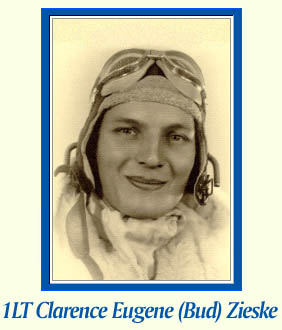

My father was born January 24, 1921. I know little about his childhood. He
graduated with a BS Degree in Chemical Engineering from Ohio State University
in 1942. He was a Colonel in the ROTC and was Senior Football Manager at Ohio
State. In July, 1942 he was appointed a 2nd Lt. in the Field Artillery Reserve.
He was called to active duty on July 23, 1942, and reported to Ft. Bragg, NC.
From Ft. Bragg he was assigned to the Tank Destroyer School at Camp Hood, TX
as an instructor in offensive and defensive demolitions.
A letter sent to my mom on Sept. 5, 1942, said: " I found out last night that it
is likely that I shall never see actual combat service in the war but will be
kept here in TD School as an instructor. Now isn't that a hell of a note. Here
I am willing to fight my head off for just a crack at the axis and they want
to stick me here in Texas." Later in the same letter, "My gosh! what will I be
able to tell our grandchildren when they ask me what I did in the War. Only
that I sat in Texas picking cactus needles out of my seat"
In a letter dated Sept. 24, 1942, "Give me a big gun that really wrecks the
place when a shell is fired. I'm not really that heartless, but I do delight in
seeing things fly up in the air. That is why I liked the demolitions I was
teaching. I'm just a little kid at heart, I guess." (He had been temporarily
assigned to Officers Tactical School).
Fed up with Tank Destroyer School, he requested a transfer to the Army Air Corp
on February 16, 1943. On May 20, 1943, my mother took a train from Columbus,
Ohio to San Antonio, TX, where they were married on May 22, 1943. On May
26, 1943, my father started preflight training. On July 14, 1943, he soloed
for the first time and was in love with it (from my mom's journal). My father
was chosen by fellow cadets to speak for them at the graduation banquet.
He completed his advanced flight training at Eagle Pass Army Air Field,
Eagle Pass, TX on January 7, 1944. He completed his training in Tallahassee,
Florida and awaited shipment overseas. My mother went back to her parents' house
in Columbus, Ohio to await his return and my birth. He was transferred to his
point of embarkation at Camp Kilmer, New Brunswick, New Jersey and shipped out
to England.
My mother received about 11 letters from my father in England. In a letter
postmarked July 18, "What is the latest news on our new adventure? I hope you
and junior are getting along fine. If he kicks too much we'll have to speak to
him about it when he grows up." The last letter was dated August 11, 1944, in
which my father kidded her about putting on a little weight in the picture she
sent. She was 8 months pregnant with me at the time. The following day he was
killed.
My father had completed 8 combat missions and had 39 hours of combat flying
time. While on a dive bombing mission, his P-51 fighter plane was hit by anti-
aircraft fire and crashed near the airfield of Rosiers, southeast of Amiens,
France. The missing air crew report states that he was seen to bail out of
his plane about 100 ft above the ground and hit the ground slightly behind his
plane. His chute never opened.
He was originally buried in grave 50 in the village cemetery of Mehaircourt,
France. He was later reburied at Arlington National Cemetery beside his older
brother, 1st Lt. Vernon Zieske, a P-47 pilot who was KIA on January 5, 1945.
My mother received the telegram reporting my father was missing in action on
August 27, 1944. Her expected delivery date was the following day, August 28.
On October 9th, she received notification that my father had been Killed in
Action. I was born that evening. My father's death and my birth appear in the
same newspaper article.
My mother never quite fully recovered from my father death. She remarried in
1947 and I was adopted by my stepfather. Though my mother talked about the
War years often, my father's letters and pictures remained locked up in a
suitcase out of sight until I was nearly 40. At that time, she handed them to
me at a family gathering for my sister's wedding. After a cursory look, they
remained hidden away in my own closet until I began transcribing them after
seeing "Saving Private Ryan." The horror of the deaths in that movie allowed
me to begin to face the pain of my father's death. A few months later, I found
AWON and in a very short time I have become very in touch with my father and the
impact that his death had.
I honor him for the choice that he made to fight in the war. It takes young men
with a sense about what they want to be able to tell their grandchildren and who
like to blow up things to fight for those freedoms that we all hold dear.
-- Joseph Mack Zieske Ormond --